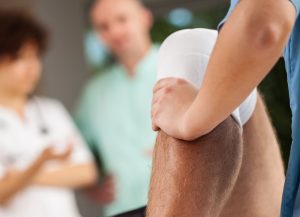Posts Tagged ‘Attune knee injuries’
FDA Proposes Changes to 510(K) Medical Device Approval Process

The Attune Knee System was approved through the FDA’s 510(K) process. Breakstone, White & Gluck is currently representing patients who have suffered Attune knee replacement failures. Free Consultation: 800-379-1244.
In 2019, the public can expect to learn more about the Food and Drug Administration (FDA)’s plans for improving the 510(K) approval process for medical devices. Instead of improving the quality of life for patients, too many medical devices are causing injuries and even death. Many of these medical devices were been approved through 510(K).
Too often, we hear about medical device injuries in the news. At Breakstone, White & Gluck, our attorneys represent patients injured by defective medical devices and other unsafe products in Massachusetts and Rhode Island, from Boston to Worcester to Providence. Our attorneys know each news story represents many more patients who have been injured.
But just how many? More than 1.7 million people have suffered injuries from medical device failures over the past decade, according to a 2018 Associated Press report. Nearly 83,000 people died. These are giant and unbelievable numbers, especially when you consider that medical devices undergo a federal approval process which should protect patients.
How the FDA 510(K) Process Works
Since 1976, manufacturers have been able to short-cut the FDA approval process. If a manufacturer can demonstrate their medical device is “substantially equivalent” to an approved medical device, they can apply through the 510(K) approval process. The manufacturer has to submit paperwork, explaining the similarities between medical devices, but they are not required to conduct additional clinical testing – even for devices which are surgically implanted such as knee and hip replacements.
FDA Proposal Calls for 10-Year Restriction
While the FDA has long been committed to the 510(K) approval process, many have argued the process needs to be more focused on patient safety. After many years of complaints, the FDA is now proposing a change to only allow manufacturers to use the 510(K) approval process when they base their applications on medical devices approved in the past 10 years.
The FDA said this change will modernize the process and ensure products and technologies continue to improve.
Here is a point that supports change. While there are 4,000 medical devices in the agency’s database, just six types have caused 25 percent of all injuries between 2008 and 2017. These include defective hip replacements, including the DePuy metal-on-metal and other hip implants, accounting for more than 103,000 injury reports. The other medical devices: spinal stimulators, surgical mesh, defibrillators, implanted insulin pumps and insulin pumps with sensors. These figures also come from the Associated Press.
Over the next few months, the FDA is taking public comment on other questions, such as should there be a public list of devices or manufacturers who make technologies that rely on devices approved more than 10 years ago? Or what would be an appropriate time period? Read more: FDA’s questions for the public.
Common Medical Device Defects and Injuries
Breakstone, White & Gluck specializes in representing those injured by medical device failures in Boston, Worcester and across Massachusetts and Rhode Island. If you have been injured, our attorneys can advise you of your legal rights for seeking compensation. Our goal is to help clients obtain prompt medical treatment and then, full compensation for financial losses, such as lost wages. Patients may also be entitled to damages for pain and suffering.
Our lawyers are experienced in handling medical device claims involving:
Knee implants. One knee replacement with a high rate of failure is the Attune Knee System, which is stabilized by a cement fixture. Patients can suffer physical pain when the cement loosens.
Hip implants. DePuy issued a recall for its ASR XL Acetabular System metal-on-metal hip implants in 2010. But many other implants followed, including the Stryker Rejuvate Modular and ABG II Modular-Neck Hip Stems, Zimmer and Smith & Nephew. Read more about what to do if you have a defective hip implant.
Surgical mesh. Patients have suffered complications after being treated with surgical mesh implants during hernia repair procedures. There have been so many injuries that the FDA has issued an advisory warning patients about the severe pain and long-term complications that can result. One type of surgical mesh which has caused injuries is the Ethicon Physiomesh® Flexible Composite hernia mesh.
Boston Medical Device Injury Lawyers – Free Legal Consultation: 800-379-1244
Learn your legal rights if you have been injured as a result of a medical device failure. For a free legal consultation, contact Breakstone, White & Gluck at 800-379-1244 or 617-723-7676 or use our contact form.


